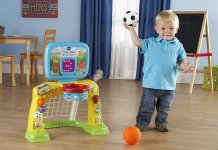There is an ever-increasing concern about childhood and teenage obesity. While there is no single cause for this unprecedented rise of metabolic-associated obesity, one of the major culprits that leading healthcare experts as well as researchers blame for this unmitigated phenomenon is decreased physical activity among children. While physical education classes are integrated in school curriculum, there is not much physical activity outside the academic environment.
It is thus crucial to encourage our kids to engage in sports activities that they really enjoy. This is because a great majority of today’s kids no longer have time for free physical play and dedicated physical education. If we can encourage them to engage in sports that they love, such as swimming, biking, or even martial arts, then we will be able to help them avert the many problems associated with childhood obesity. Of course, there are plenty more reasons why kids should play sports. Here are 5 of them.
Lays the Foundation for the Child’s Physical Fitness and Overall Health
It is very obvious that the main reason why kids need to play sports is for them to develop and maintain a certain level of physical fitness that will serve as the foundation for optimum health. The body is like a well-oiled machine. The different components, no matter how far apart they are, have an impact on the rest of the machine. If one fails, its effects will also be seen in other components.
The same thing happens with the body. For instance, if the cardiovascular system is not supported, then the delivery of oxygen can be compromised. When cells don’t receive oxygen, they tend to use other substances as fuel for their metabolic processes. These processes can lead to the accumulation of toxic byproducts that can affect other parts of the body. Unfortunately, oxygen is not the only substance delivered by blood. It also carries all the essential nutrients needed for optimal functioning. If there is a problem with the heart’s ability to pump blood, then cells will starve and they won’t function efficiently. This is just for the cardiovascular system. And there are many organ systems in our body.
When children go into sports, they will train. They will use their muscles to become more efficient in the use of energy, oxygen, and nutrients. Over time, their heart muscles will become so efficient that even if they are going to run several miles, they will not tire easily. Why? It’s because the heart and the lungs have already adapted to the increased need for oxygen and nutrients. The immune system is also enhanced thus, protecting your kid from possible infections. The muscles tend to grow stronger and exhibit greater tonicity which can also help in burning more fat, aiding in the management of childhood obesity. The kidneys will function optimally because of an increase in the delivery blood to this organ. Everything will be functioning at optimum levels. And this is what leads to good health in children.
Teaches Kids How to Create and Achieve a Goal
Children who play sports often have to start with very little belief in their selves. They normally wouldn’t know if they can accomplish a particular maneuver or a certain move. For instance, a child who goes into martial arts will be so overwhelmed by the actions that he or she sees in films. These will be too difficult for the child. Breaking bricks and wood boards is not easy. Flying through the air in a kicking stance will look like magic for them. Being ganged up upon by several opponents can look frightening. This leaves doubt in their capabilities.
But sports are never one night affairs. It takes dedication and commitment to learn the different techniques that are inherent in any sport. When children engage in sports, they learn that by training and by focusing their energies one step at a time, they will also be able to reach the status of the sport’s greatest names.
The point is that children will learn how to set a goal and, more importantly, learn how to achieve this goal. It is crucial for children to understand that goals will be very general and they may seem very formidable. But, by taking small sequential steps, one building on the other, this goal can also be achieved.
For example, if one of their goals is to break a 1-inch thick wood plank with a single karate chop, then they must train hard for it. First, they know that they need to strengthen their hands. They know they will also need to master channeling their energies into the muscles of the hands. Then, they will have to learn how to focus this energy on a single point on the wood plank. And there will always be other steps they have to go through before they are ready with breaking the board.
Builds Self-Confidence and Enhances Self-Esteem
Just imagine a child who, at the beginning of the class for his or her favorite sport, couldn’t even dribble a ball in place, know the correct stance of a karateka, or even hold his or her breath under water. Then, with time and training, the child is more than able to shoot a 3-pointer, perform a high standing kick, or even swim in the butterfly style. The child has remarkably achieved something. And this can do a lot of things on the child’s self-confidence as well as self-esteem.
It’s not easy to build self-confidence in children. They know that they don’t have the capabilities of grownups yet. However, being able to accomplish something, being able to achieve their goal, can provide the necessary boost in their belief in their selves. An increase in self-confidence will also have an impact in other aspects of the kid’s life. His or her academic performance will also improve simply because he or she has already learned the importance of taking small, necessary steps to achieve their goals.
This sense of achievement can also provide the foundation for an enhancement of their self-esteem. This, in turn, helps improve their emotional skills. They are able to feel more content, happier about what they have done. And as we all know, emotional health is something that can never be achieved by taking supplements or medications or any other substance. It can only come naturally.
Provides Opportunities to Deal with Adversity
Life is full of challenges. Even in school, children are in constant struggles. Many become the subject of bullying which can significantly affect a child’s emotional health. Sports can help children learn how to deal with adversities that come their way. They learn to control their emotions so that they can focus on more constructive outcomes. They learn that, in sports, as it is in real life, there will always be winners and there will be losers. The question now is how they will be able to manage their difficulties or adversities.
In sports, errors or mistakes can often have consequences. It can be a lost opportunity at the gold medal, trophy, or belt. Or it can also be a broken bone, a bruised ego, or even diminished self-esteem. But, sports also teach kids that it’s okay to make mistakes. The more important thing is to get up and learn from these mistakes and to persevere so they don’t happen again.
Many adults often find themselves in a deep hole that no matter how hard they try, they’re way in over their heads. Children are taught never to give up. Sports encourage them to always look for newer ways to tackle a particular problem so they will achieve their goals. They are taught how they can rebound and recover from a setback which, in the real world setting, is full of.
Develops Invaluable Interpersonal Skills
Everyone knows the idiom “No man is an island”. And, everyone knows what it really means. But for children, they may take it literally. However, with sports, they will learn the value of establishing mutually beneficial relationships with their coaches, trainers, and fellow players. They learn to speak the same language so they can effectively communicate to their team-mates what needs to be done. Even in solo sports, they will always have to communicate with their trainers and coaches as well as the individuals who are officiating the game. All of these can develop and enhance their interpersonal skills.
Interpersonal relationship is very important to survive in the adult world. Wherever you go, you will always be interacting with another person whether it is simply buying a ticket for a bus ride or even giving directions to a stranger. While these form part of our communication skills, the context in which we use them is inherently within the realm of our relationship with our fellow human beings. Sports teach kids how to nurture this relationship with other people so that communication, respect, and trust can be developed.
These are just five reasons why kids should play sports. In a gist, sports make a child a much better person. When coupled with the love and care of parents and siblings, this can be a very formidable tool in the development of future nation-builders.
You May Also Like
10 Best Kid’s Baseball Gloves
10 Best Sports Toys For Toddlers
10 Awesome Golf Sets For Kids
8 Best Punching Bags for Kids
10 Best Air Hockey Tables
10 Best Foosball Tables











